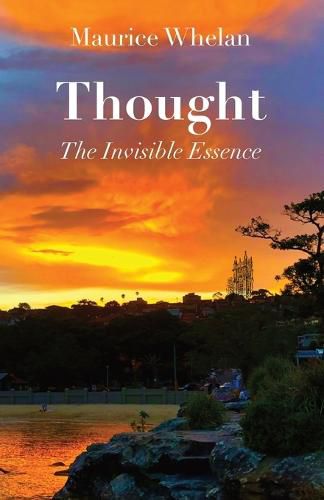Readings Newsletter
Become a Readings Member to make your shopping experience even easier.
Sign in or sign up for free!
You’re not far away from qualifying for FREE standard shipping within Australia
You’ve qualified for FREE standard shipping within Australia
The cart is loading…






This title is printed to order. This book may have been self-published. If so, we cannot guarantee the quality of the content. In the main most books will have gone through the editing process however some may not. We therefore suggest that you be aware of this before ordering this book. If in doubt check either the author or publisher’s details as we are unable to accept any returns unless they are faulty. Please contact us if you have any questions.
‘It struck me at some point when reading Maurice Whelan’s Thought: The Invisible Essence that thinking, a bit like reading, writing and dreaming, is not framed often enough as conversation. As readers, when we’re lucky, we enter into dialogue with the writer, and when fruitful, the conversation continues long after the book is finished. This poetic and meditative book offers an unhurried, deep analytic conversation with Maurice, as he wanders through the question of what it is to have a mind and to use it.’ - Charlie Stansfield
Maurice Whelan, psychoanalyst, poet, novelist, non-fiction writer, travels down many paths and asks the reader to travel with him. The places he offers are real and imagined: William Hazlitt’s English countryside, John McGahern’s Ireland’s lanes and hedgerows; Shakespeare’s island in The Tempest, Richard Dyer’s poetic kingdom of the mind. And more. All places become spaces to the extent we are willing to explore them. Some journeys are not easy. Whelan uses his knowledge of Irish history, of the internal workings of the Catholic church and his lifetime experiences as a social worker and psychoanalyst, to interrogate the scandal of clerical child sexual abuse. He highlights an abject failure to think about the damage done to children, to their minds, hearts and souls. While content to wander, Whelan has the real business of living in his sights. He sees an appreciation of the essence of thought as necessary to maintain and improve the living of any life.
$9.00 standard shipping within Australia
FREE standard shipping within Australia for orders over $100.00
Express & International shipping calculated at checkout
This title is printed to order. This book may have been self-published. If so, we cannot guarantee the quality of the content. In the main most books will have gone through the editing process however some may not. We therefore suggest that you be aware of this before ordering this book. If in doubt check either the author or publisher’s details as we are unable to accept any returns unless they are faulty. Please contact us if you have any questions.
‘It struck me at some point when reading Maurice Whelan’s Thought: The Invisible Essence that thinking, a bit like reading, writing and dreaming, is not framed often enough as conversation. As readers, when we’re lucky, we enter into dialogue with the writer, and when fruitful, the conversation continues long after the book is finished. This poetic and meditative book offers an unhurried, deep analytic conversation with Maurice, as he wanders through the question of what it is to have a mind and to use it.’ - Charlie Stansfield
Maurice Whelan, psychoanalyst, poet, novelist, non-fiction writer, travels down many paths and asks the reader to travel with him. The places he offers are real and imagined: William Hazlitt’s English countryside, John McGahern’s Ireland’s lanes and hedgerows; Shakespeare’s island in The Tempest, Richard Dyer’s poetic kingdom of the mind. And more. All places become spaces to the extent we are willing to explore them. Some journeys are not easy. Whelan uses his knowledge of Irish history, of the internal workings of the Catholic church and his lifetime experiences as a social worker and psychoanalyst, to interrogate the scandal of clerical child sexual abuse. He highlights an abject failure to think about the damage done to children, to their minds, hearts and souls. While content to wander, Whelan has the real business of living in his sights. He sees an appreciation of the essence of thought as necessary to maintain and improve the living of any life.